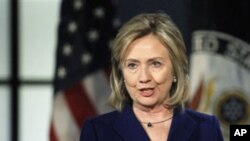U.S. Secretary of State Hillary Clinton is warning countries that would curb the Internet that they cannot hold back popular discontent forever, and will risk losing the benefits of a inter-connected world economy. In a major address on Internet policy in Washington, she said the United States strongly supports "the freedom to connect."
Clinton acknowledged that despite its benefits, the Internet can be a conduit for hate speech, or in the case of Wikileaks, an outlet for publishing stolen classified U.S. documents.
But the Secretary made clear the United States places itself "on the side of openness," and said while Internet freedom - like all freedoms - raises tensions, the benefits are worth it.
Clinton’s policy address, at George Washington University a few blocks from the State Department, came amid a groundswell of protests in the Middle East, propelled in part by activists using social media sites such as Twitter and Facebook.
Affected countries have tried varying ways to stifle dissent by shutting down websites or halting Internet service altogether, but Clinton said countries that clamp down on bloggers, opposition websites, and news outlets do so at their own risk.
"Governments who have erected barriers to Internet freedom - whether they are technical filters or censorship regimes, or attacks on those who exercise their rights to expression and assembly online - will eventually find themselves boxed in. They will face a dictator’s dilemma, and have to choose between letting the walls fall, or paying the price to keep them standing. Which means both doubling down on a losing hand by resorting to greater oppression, and enduring the escalating opportunity cost of missing out on the ideas that have been blocked and people who have been ‘disappeared," she said.
Clinton said freedom of thought and the "level playing field" brought by the rule of law are what fuels innovation, and when countries curtail Internet freedom, they place limits on their economic future.
The Secretary has spent much of her time since late November in overseas diplomacy aimed at repairing damage to U.S. relationships caused by the Internet release of thousands of State Department documents by the activist website Wikileaks.
In her address, she said a balance must be struck between the need for confidentiality in diplomacy and transparency, to which the Obama administration is committed.
"The scale should, and will, always be tipped in favor of openness. But tipping the scale over completely serves no one’s interests. Let me be clear. I said that the Wikileaks incident began with a theft, just as if it had been executed by smuggling papers in a briefcase. The fact that Wikileaks used the Internet is not the reason we criticized its action. Wikileaks does not challenge our commitment to Internet freedom," she said.
Clinton said the Obama administration will spend $25 million this year supporting technical experts and activists looking into various ways to get around government curbs on the Internet.
Critics say the administration has dawdled by failing to invest in proven 'circumvention' technology that would allow Internet users to evade government controls by routing traffic to servers in other countries. But Clinton said there is no one quick fix for fighting Internet restrictions.
"We support multiple tools, so if repressive governments figure out how to target one, others are available. And we invest in the cutting edge because we know that repressive governments are constantly innovating their methods of oppression, and we intend to stay ahead of them," she said.
The secretary also said the State Department is committed to expanding direct Internet conversation with people around the world. She said department Twitter feeds, which began last week in Arabic and Farsi, will soon also include Chinese, Russian and Hindi.
Clinton Warns Efforts to Curb Internet Will Backfire




